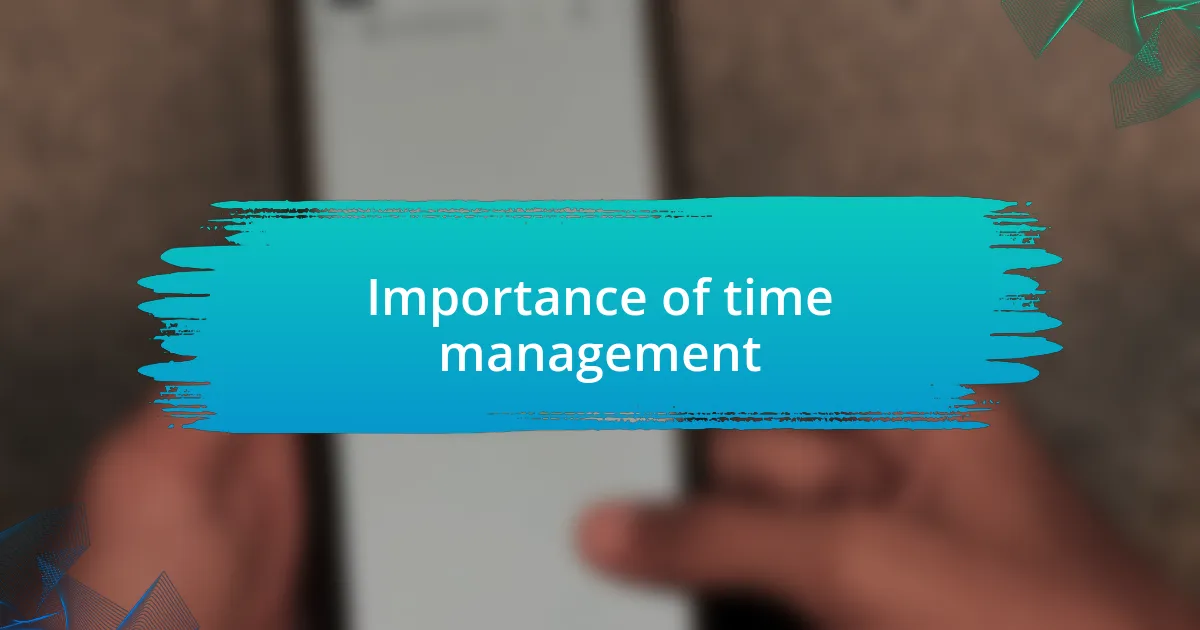Key takeaways:
- Time audits involve tracking daily activities to identify inefficiencies and improve productivity.
- Effective time management leads to increased productivity and reduced stress, enhancing both professional and personal life.
- Setting SMART goals provides clarity and structure, helping to achieve desired outcomes and stay focused.
- Ongoing time audits promote accountability, enabling continuous improvement in time management practices.

Understanding time audits
Understanding time audits can feel a bit daunting at first, but I like to think of them as a journey towards greater clarity in how I spend my days. A time audit involves meticulously tracking how every minute of your workday is utilized, identifying inefficiencies along the way. Have you ever wondered why certain tasks seem to take longer than anticipated? That realization can be a real eye-opener.
When I first undertook a time audit, I was surprised at how many distractions chipped away at my productivity. For example, I discovered that I spent a significant amount of time checking emails instead of focusing on priority projects. It made me reflect on how these small habits can accumulate into significant losses in time. I started questioning how often I really needed to check my inbox versus dedicating blocks of time for focused work – a shift that truly transformed my workflow.
Ultimately, a time audit is not just about tracking time; it’s about understanding yourself better. I had to confront some uncomfortable truths about my priorities and habits, which was both challenging and liberating. When you take the time to analyze your activities, you might find surprising insights that can lead to meaningful changes in your routine. Isn’t it fascinating to see how small adjustments can bring about impactful shifts in our overall productivity?

Importance of time management
Effective time management is essential in today’s fast-paced world. I can’t stress enough how much I’ve benefited from honing this skill. When I started managing my time more wisely, I noticed a significant reduction in my stress levels. I was no longer overwhelmed by tasks that seemed to multiply. This newfound control allowed me to approach my work with a clear mind.
Here are some key reasons why time management is so important:
- Increased productivity: Organizing my tasks helped me accomplish more in less time.
- Reduced stress: Focusing on what truly mattered alleviated the pressure of looming deadlines.
- Improved decision-making: With a clearer perspective on my priorities, I made better choices.
- Enhanced personal life: Better time management opened up opportunities for relaxation and hobbies.
- Greater self-discipline: I found that adhering to a structured schedule boosted my commitment to tasks.
Taking the time to respect and manage my hours has reshaped not just my work life but also my personal enjoyment of daily activities.

Setting clear goals
Setting clear goals is a fundamental step in mastering time audits. When I first began this journey, I realized that vague intentions often led to scattered efforts. I took the time to sit down and outline exactly what I wanted to achieve—both short-term and long-term. This clarity was transformative; it provided a roadmap that dramatically improved my focus.
I also learned to make my goals SMART—Specific, Measurable, Achievable, Relevant, and Time-bound. For instance, instead of saying, “I want to be more efficient,” I crafted a goal like, “I will complete my daily tasks by 3 PM each day for the next month.” This structured approach allowed me to track my progress and make adjustments when necessary. It was empowering to see my intentions materialize into tangible results.
Through this process, I discovered that regularly revisiting my goals kept them fresh in my mind. I would often reflect on what I’d achieved at the end of each week, celebrating small victories while also preparing to tackle new challenges. This practice reinforced my commitment—not just to the goals themselves, but to my overall journey towards effective time management.
| Goal Type | Description |
|---|---|
| Short-term | Achievable within days or weeks, often focused on daily tasks. |
| Long-term | Set with a broader vision in mind, usually spanning months or years. |

Tools for tracking time
When diving into time tracking, I found that having the right tools made all the difference. I experimented with various apps like Toggl and Clockify, which helped me visualize exactly where my hours were going. It was fascinating to see the breakdown of my day; I could identify time sinks I had never even considered. Have you ever been surprised by how much time you spend on a mundane task?
I also appreciated the simplicity of using a good old-fashioned pen and paper for tracking. There was something meditative about writing down what I did hour by hour. This tactile method forced me to be more aware and intentional about each task. Plus, the act of crossing something off my list brought an immediate sense of accomplishment that no digital notification could replicate.
For me, setting reminders and alarms on my phone proved invaluable too. They nudged me when I was at risk of losing focus. Have you ever noticed how a gentle prompt helps steer you back on track? This approach created a rhythm to my day, turning my time management from a daunting chore into a more manageable and even enjoyable process.

Analyzing time audit results
Once I had gathered the data from my time audits, I felt a mix of curiosity and apprehension. Analyzing those results was like peeling back layers of an onion, revealing insights I hadn’t even considered before. For example, I discovered that I spent nearly two hours daily in meetings that often felt unproductive. This realization triggered a desire to advocate for clearer agendas and more focused discussions.
As I sorted through the hours, I began to notice patterns that were surprisingly enlightening. I found that certain tasks drained my energy faster than others, making me wonder if I was aligning my time with my natural productivity rhythms. I still recall the moment I realized that working on creative projects in the morning when I was most alert led to more satisfying outcomes. Isn’t it fascinating how small changes can lead to significant improvements?
The key to effectively analyzing time audit results lies in being honest with ourselves. Holding a mirror up to my daily habits wasn’t always comfortable, but it forced me to confront the areas where I could improve. By identifying these inefficient habits and areas for growth, I ultimately became more in control of my day. Have you ever taken a hard look at your routines and found ways to reshape them for the better? It made all the difference for me.

Implementing changes based on findings
Implementing changes based on my findings from the time audit was a crucial step in my journey. I remember feeling a sense of empowerment when I decided to cut down on those lengthy meetings. Instead of leaving my schedule open to anyone who wanted to chat, I started prioritizing time blocks for focused work, which dramatically improved my productivity. Have you ever noticed how more structure can lead to unexpected freedom in your schedule?
As I began to tweak my daily habits, one particular change stood out: I allocated specific hours for deep work. This meant saying no to distractions during those peak times. The first time I experimented with this approach, the rush of completing a challenging project felt exhilarating. I began to crave that focused time, which made me realize how valuable it is to protect our most productive hours. Doesn’t it seem counterintuitive that carving out time for ourselves can lead to enhanced output?
While making these adjustments, the emotional aspect was just as important as the logistical changes. I found that by reallocating my energy to tasks that resonated with me, I felt more fulfilled overall. Each achievement, no matter how small, built my confidence and motivation. It’s remarkable how aligning your tasks with your values can transform your workday into something more meaningful, don’t you think?

Maintaining ongoing time audits
Maintaining ongoing time audits became an essential practice for me once I recognized their value in my daily routine. Each week, I sat down with my planner to reflect on how I had spent my time. In those moments of introspection, I was often surprised by how much time slipped away on unproductive tasks. Have you ever found yourself wondering where the day went? It can be eye-opening.
As I continued this process, I developed a keen awareness of my time drains—those little habits that creep in and steal precious moments. I recall identifying social media scrolling as a significant culprit; it took me a while to realize just how much it affected my focus. By setting more intentional boundaries, like limiting my checking to just a couple of scheduled times a day, I felt a rush of relief and control. Isn’t it fascinating how small changes can make a big difference in our daily productivity?
Engaging with regular time audits also shaped my mindset toward accountability. Each review session offered not just data but emotional insight into my habits. I often ended these sessions feeling both motivated and challenged to improve further. Reflecting on the past week’s successes and areas for growth became a ritual I looked forward to. What if we approached our time management with the same curiosity and openness as self-reflection? It can profoundly impact not just our schedules but our overall well-being.

